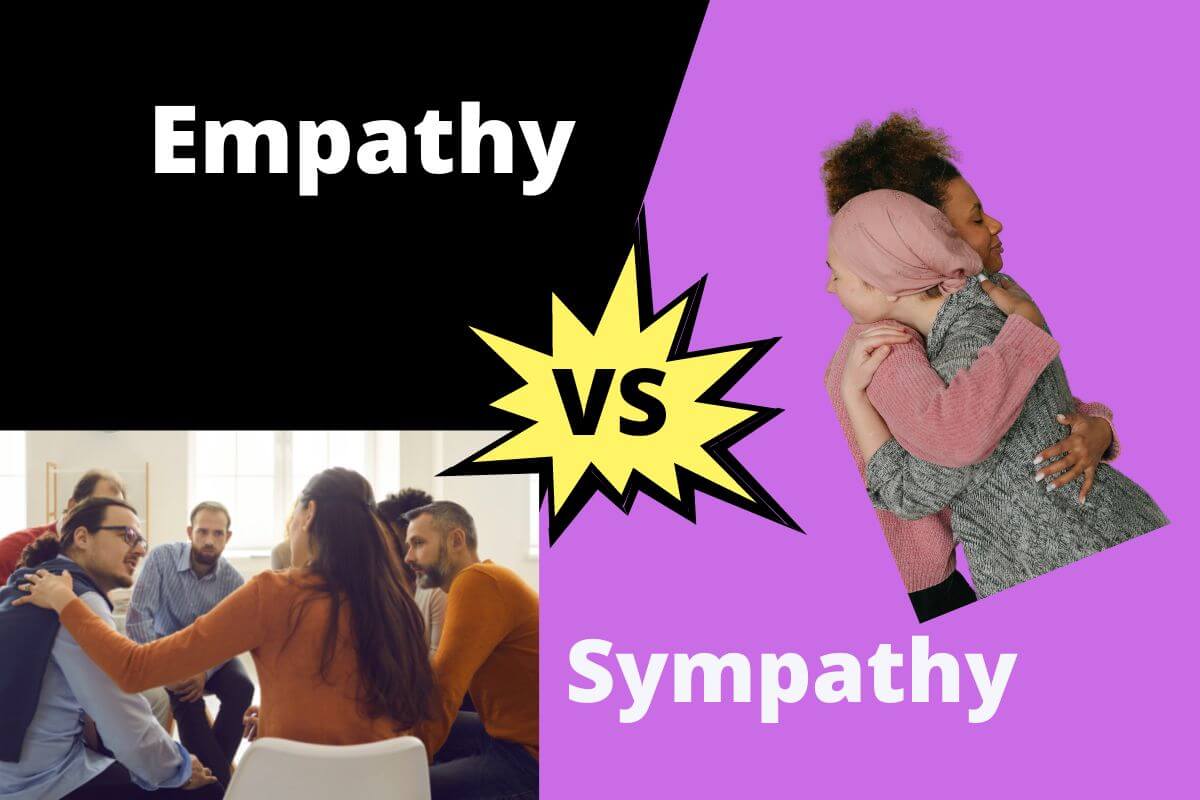Empathy is the ability to put yourself in someone else’s shoes and consider their perspective. Sympathy, on the other hand, is the ability to feel compassionate toward someone else.
Both terms deal with similar feelings and originate from the Greek name pathos, which relates to pain and suffering.
Table of Contents
Empathy vs. Sympathy
| Empathy | vs. | Sympathy |
| The capacity to put oneself in another person’s shoes and understand what they’re going through | Meaning | Feelings of tenderness, grief, sadness, or contempt for another person or persons who are going through a tough time |
| Newer word | Origin | Ancient term in use for centuries |
| Can be supportive | Emotional encounter | Can be patronizing, distant, or aloof |
| Generally positive | Difference in concepts | Less positive than empathy |
Difference Between Empathy and Sympathy
Meaning
Empathy is more powerful than sympathy. It’s more than just feeling sorry for someone’s loss.
Empathy is the capacity to put yourself in another person’s shoes and understand their feelings by identifying with them.
The Act of Empathizing
Empathy means putting yourself in another person’s situation and seeing the problem through their eyes to understand what they are truly going through. The term is about sharing the other person’s emotions rather than feeling sorry for them.
An empathetic person can accurately comprehend and share the sentiments of another person, even if they have never been in a comparable scenario.
You may feel empathy (noun) for an individual or empathize (verb) with them.
Lacking Empathy
Someone who lacks empathy may not comprehend why another person is angry about a situation since they’re unable to or will not consider that person’s shoes.
Sympathy
Sympathy includes feelings of tenderness, grief, sadness, or contempt for another person or persons who are going through a tough time.
It’s a sentiment felt in response to anything that occurs to others. You express sympathy for someone when you feel sad for them and wish for their well-being.
When a loved one feels pain, it’s natural to feel sympathy for that individual and their family, be it a friend or a coworker.
The Act of Sympathizing
You might send a condolence note to someone to convey sympathy toward them. You might feel sympathy (noun) for or sympathize (verb) with someone in a similar situation.
Origin
Empathy is a newer addition to the English language. In contrast, humans used the term sympathy for over three centuries before the term empathy appeared.
Empathy and sympathy have the same suffix, -pathy, meaning they’re derived from the same Greek word pathos.
Despite their Greek origins, both terms aren’t synonyms. People use the term sympathy to express how they share the sentiments of others. On the other hand, empathy occurs when individuals share and understand the feelings of others.
Sympathy may refer to harmony between people with similar beliefs and likes. On the other hand, empathy can include linking your attitudes or emotions to an object or experience. Such artifacts may be natural objects, paintings, or anything with an emotional worth.

Emotional Encounter
It’s important to learn how to express empathy and sympathy. Sometimes, an inappropriate expression of sympathy can become patronizing, which you want to avoid.
Expressing sympathy creates a division between you and the other person, implying that you are fortunate to have overcome the difficulties or personal experiences. At the same time, they are unfortunate and continue to struggle. Saying, “I’m sorry you’ve suffered this way” is an isolating phrase.
Expressing Support Through Empathy
Saying, “I’m sorry you’ve suffered” alone communicates pity rather than support. If you want to demonstrate empathy, you may say, “I’m sorry you’re going through this. Know that you’re not alone.” This provides the other person a feeling of company, that they are not alone, and that there is still hope for them.
Empathy arises in the present moment. You demonstrate empathy by submerging yourself in another person’s environment without becoming them. You maintain your sense of self and that you are genuinely outside the situation.
This allows you the emotional intelligence to be helpful rather than getting caught up in your feelings or problem. In certain circumstances, advice is an enemy of empathy since you want to remain in their reality rather than make yourself feel better.

Empathy Comes from Life Experience
Both empathy and sympathy are emotions, but they are not necessarily felt simultaneously. For instance, people who have lost a loved one may get sympathy from other people. Still, only others who have suffered a comparable loss can fully understand.
Someone who declares bankruptcy is an example of who may get sympathy but not empathy. Most individuals who worry about that person would sympathize with their situation and even pity them, but few would be able to empathize since filing for bankruptcy is uncommon.
Empathy and Compassion
Compassion, the foundation of sympathy and empathy, is a combination of acceptance and understanding of others. You gain compassion and strengthened it with knowledge and wisdom.
Compassion identifies the shared emotional similarity between humans. Both sympathy and empathy entail understanding another person.
Still, empathy enhances or expands the care by allowing you to experience the other person’s feelings, understand their point of view, and show compassion toward them.
Similar, But Not the Same
Empathy and compassion are often used interchangeably.
Though they have a similar thread, the two concepts are somewhat separate. Understanding another person’s feelings fuels both compassion and empathy. They both have a strong desire and capacity to connect with others and experience their anguish.
Compassion takes a step further when a person understands another’s problem or situation and is driven to assist them.
If you’ve found this article useful, check out our post comparing love and in love.

